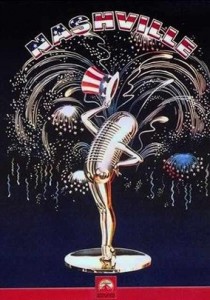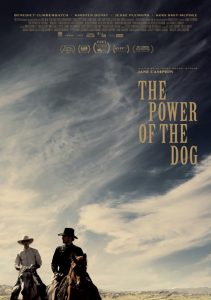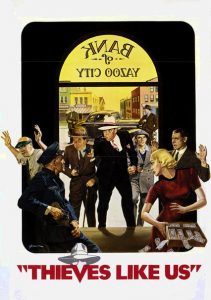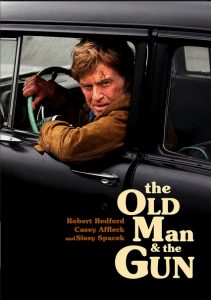Nashville-1975
Director Robert Altman
Starring Lily Tomlin, Keith Carradine, Karen Black
Top 250 Films #3
Scott’s Review #47
Reviewed June 19, 2014
Grade: A
Nashville (1975) is a brilliant film.
I have found that with each subsequent viewing, it creeps higher and higher on my list of favorite movies of all time.
The style is unique (largely improvised) and epitomizes creative freedom in the film during the 1970s.
Director Robert Altman lets his actors express themselves, even allowing them to write their songs; the dialogue overlaps at times, which results in a natural feeling as the viewer watches the cast of twenty-four principals intersect over five days at a political rally/country music festival.
It is pure Robert Altman at his finest.
Nashville is a satire of the political arena of the early 1970s, particularly the Vietnam conflict and its politicians.
The film certainly questions and challenges the government with an ironic patriotic setting (Nashville).
The country music industry was in uproar upon the film’s initial release. It is a layered film that can be discussed and appreciated, and every character is cared about.
I cannot adequately describe the multitude of nuances in each scene that are noticed over time.
Each character, even those with limited screen time, is vital to the story, as are the political elements —the questions of war, policies, and so on.
The chaotic bits and individual storylines come together at the end, and many background happenings are exciting to watch and take note of throughout each viewing.
With each experience, the audience will notice more and more. I certainly do.
Lily Tomlin, for example, plays Linnea, a haggard mother of deaf children with a supportive husband, a woman who, on the surface, is heroic; yet, she is a complex character. She is bored with her life and falls in love with a young musician despite the guilt and repercussions.
The musician in question is Tom Frank, played by Keith Carradine. Handsome and self-absorbed, he arrives in Nashville to dump his bandmates in hopes of a solo career and beds many willing females.
He also lashes out at a soldier at the airport, saying, “Kill anyone lately?”
Despite his unlikable character, Carradine gives one of the most beautiful performances in the film when he sings “I’m Easy”.
Several of the female characters assume he is singing the song for them, but who is he truly singing it for — if anyone?
Another character to analyze is Barbara Jean, played by Ronee Blakley. A frail yet very successful country singer, she is in and out of hospitals as she frets about her replacement singer stealing her thunder.
Her insecurities rise to the surface.
Insecurity is a common theme among the characters. Many of them are unsure, afraid, or lack confidence in their musical talent, relationships, or themselves.
These are only three examples of the twenty-four richly layered characters- some ambitious, some falling apart, others meandering through life.
Many songs throughout were written and performed by the actors themselves.
Nashville (1975) is storytelling and filmmaking at its best. A creation by Altman that is deservedly admired, revered, and heralded as a significant influence.
It is studied in film schools as it should be.
Oscar Nominations: 1 win-Best Picture, Best Director-Robert Altman, Best Supporting Actress-Ronee Blakley, Lily Tomlin, Best Original Song-“I’m Easy” (won)



